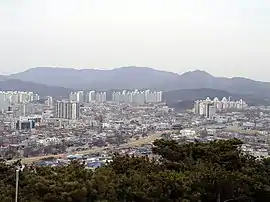Gwanggyosan
Gwanggyosan (582 m[1]) is a big mountain in Gyeonggi Province, South Korea. It lies on the border of Suwon and Yongin, though the wider range extends north and so also borders Uiwang, Gwacheon, Seoul and Seongnam.[2]
| Gwanggyosan | |
|---|---|
 | |
| Highest point | |
| Elevation | 582 m (1,909 ft) |
| Prominence | 582 m (1,909 ft) |
| Coordinates | 37°20′41″N 127°02′02″E |
| Geography | |
| Location | South Korea |
| Parent range | Gwanggyosan Range |
| Climbing | |
| Easiest route | Gwanggyo Reservoir, Suwon |
| Korean name | |
| Hangul | |
|---|---|
| Hanja | |
| Revised Romanization | Gwanggyosan |
| McCune–Reischauer | Kwanggyosan |
The summit offers views across Suwon, Yongin and Bundang. The mountain is commonly hiked from Gwanggyo Reservoir in Suwon.[3]
Gwanggyosan and Pungsu
Interpreted within the context of traditional Korean logic and beliefs – especially within the realm of Korean Confucianism – Gwanggyosan serves as Suwon's jinsan, or Guardian Mountain. This is in keeping with the logic of pungsu (known as feng shui in China), which avers that an ideal site for a city or town is one where there is a jinsan to the north, an open vista, river or a large body of water to the south, and either mountains or valleys to the east and west.[4] As Suwon's jinsan, Gwanggyosan provides a natural landmark indicating the city's position to travelers [5] and acts as a sort of "shield" against the harsh winds from the north in wintertime. Aiding Gwanggyosan in providing a favorable sense of pungsu to Suwon are the flat farms and paddies in the southern portions of Gwonseon-gu and Yeongtong-gu, Chilbo-san to the west, and the hills along Suwon's border with Yongin to the east.
Gallery
 Summit stone
Summit stone SE Seoul and Seongnam seen from Gwanggyosan
SE Seoul and Seongnam seen from Gwanggyosan Suji seen from Gwanggyosan
Suji seen from Gwanggyosan Gwanggyo Reservoir at the southern foot of the mountain
Gwanggyo Reservoir at the southern foot of the mountain
References
- "한국의 산하 – 광교산 (Hangugui Sanha – Gwanggyosan)". Korean mountaineering association website. Retrieved 2007-08-07.
- "광교산" (in Korean). Retrieved 2018-06-14.
- "Welcome to Suwon – Gwanggyosan". Suwon City Council. Retrieved 2008-02-18.
- Korean Anthropology: Contemporary Korean Culture in Flux. Eds. Korean National Commission for UNESCO. 2003, pg. 89.
- Korean Anthropology: Contemporary Korean Culture in Flux. Eds. Korean National Commission for UNESCO. 2003, pg. 90.